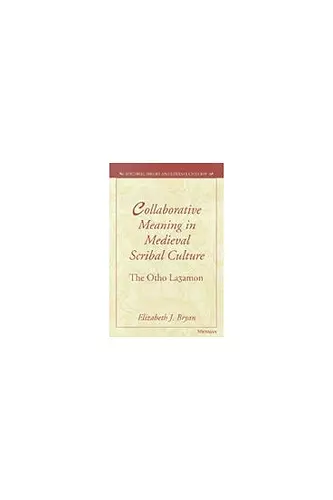Collaborative Meaning in Medieval Scribal Culture
The Otho La3amon
Elizabeth Johnson Bryan author
Format:Hardback
Publisher:The University of Michigan Press
Published:16th Sep '99
Currently unavailable, and unfortunately no date known when it will be back

Before the technology of print, every book was unique. Two manuscripts of the "same" text could package and transmit that text very differently, depending on the choices made by scribes, compilers, translators, annotators, and decorators. Is it appropriate, Elizabeth Bryan asks, for us to read these books as products of a single author's consciousness? And if not, how do we read them?
In Collaborative Meaning in Medieval Scribal Culture, Bryan compares examples from the British Library Cotton Otho C.xiii manuscript of La3amon's Brut, the early thirteenth-century verse history that translated King Arthur into English for the first time. She discovers cultural attitudes that valued communal aspects of manuscript texts--for example, a view of the physical book as connecting all who read or even held it to each other.
The study is divided into two parts. Part one presents Early Middle English concepts of "enjoining" texts and explores the theoretical and methodological challenges they pose to present-day readers of scribally-produced texts. Part two conducts a detailed study of the multiple interpretations built into the manuscript text. Illustrations of manuscript pages accompany analysis, and the reader is invited to engage in interpreting the manuscript text.
Collaborative Meaning in Medieval Scribal Culture will be of interest to students and specialists in medieval chronicle histories, Middle English, Arthurian literature, and literary and textual theory.
Elizabeth J. Bryan is Associate Professor of English, Brown University.
"This book is called to be a landmark. . . The growing methodology brilliantly applied by Bryan will certainly be adopted by growing numbers of medievalists, and anyone interested in the theoretical implications of the erosion of authorial control in the electronic age will find this study both valuable and stimulating. Make sure your libraries have it on their shelves!"
--Francoise HM Le Saux, Arthuriana, Volume 11, No. 3 (Fall 2001)
"What makes Bryan's work so interesting is that it is the first book-length study to concentrate on the Otho text in its own right, and not only on the text, but also on the manuscript itself."
--E. Koper, Bulletin Colicologique, 2001, Volume 2
"Elizabeth Bryan has done a valuable service for Lahamon scholars by her pioneering work on the Otho manuscript which is now, with added material, available in print, and for medieval scholars in general by suggesting fruitful ways forward in an alternative (though I would add the caveat of not exclusive) approach to the study of medieval manuscripts. Though her interpretations of the Otho annotations may be open to argument, they are always interesting, while the detailed and solid scholarship on the manuscript text itself will be of lasting help to Lahamon studies."
--Carole Weinberg, University of Manchester, Journal of the Early Book Society, Volume 4: 2001
"This was a book for delight and study. . . . Bryan's light-enhanced and enlightening study now gives Otho further weight by providing conclusive evidence that Renaissance antiquarian scholars both used and understood this medieval text copied three centuries earlier."
--Rosamund Allen, Notes and Queries, Volume 48, No. 3
[Bryan] puts forth daring hypotheses and provides generally sound support of her overall argument about the multiple makers and interpretive frameworks of texts in manuscript culture, as well as a treasury of materials by which others might pursue this instance of it further."
--Andrew Galloway, Cornell University, Speculum: Journal of Medieval Studies
ISBN: 9780472109494
Dimensions: unknown
Weight: unknown
264 pages